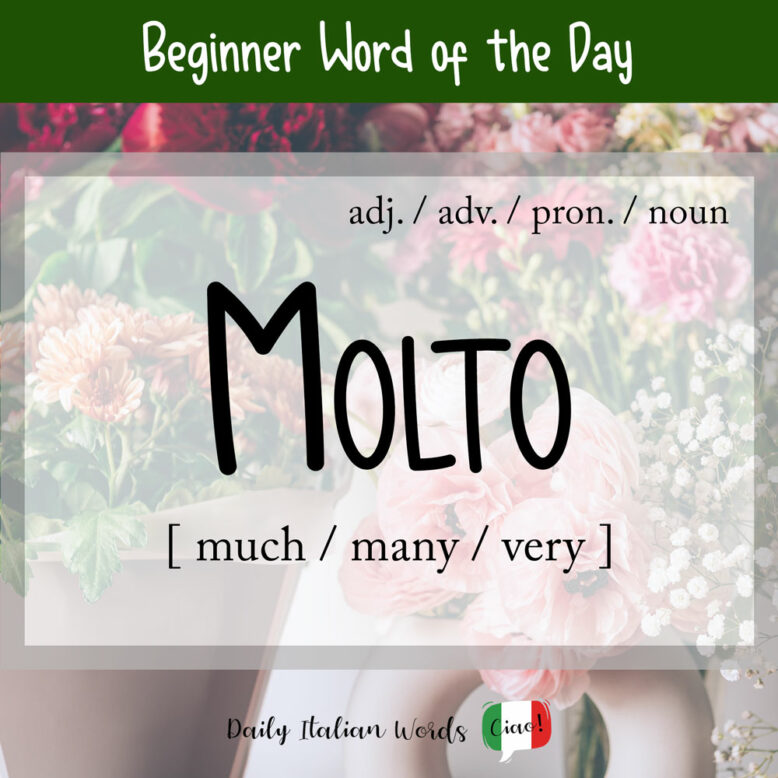One of the first words that will enter your survival vocabulary in Italy is molto (plural: molti | feminine: molta | plural feminine: molte).

It can mean either much or many depending on whether you are referring to uncountable nouns (such as electricity, water or happiness) or countable nouns (such as apples, dogs or cars). A key thing to remember is that molto always comes before the noun.
Non ho molti soldi ma ho molti amici.
I don’t have much money but I have many friends.
Another good translation for molto is a lot which can refer to both countable and uncountable nouns in English.
Conosco molte persone che parlano l’italiano.
I know a lot of people who speak Italian.
Ci vuole molto coraggio per parlare in pubblico.
It takes a lot of courage to speak in public.
Molto can also follow verbs when the meaning is a lot.
Mi piace molto.
I like it a lot.
It can also be used as a pronoun when the noun in question is obvious, just as in English.
Non ho molto da dire…
I don’t have a lot (of things) to say…
Molti hanno cercato il tesoro.
Many (people) have looked for the treasure.

If you want to emphasise molto, you can add the suffix –issimo (absolute superlative) to the end of the word, giving you moltissimo (plural: moltissimi | feminine: moltissima | plural feminine: moltissime).
In English, we don’t have an equivalent to the absolute superlative, so we either have to use submodifiers such as very or extremely to add emphasis or place stress on the words more/much/a lot themselves.
Lui ha moltissimi soldi.
He has a lot of money. (With stress on “a lot”)
Abbiamo avuto moltissima pazienza con lei.
We’ve been extremely patient with her.
Molto can also mean very when it precedes an adjective. For example, if it comes before the word bene (good or well), you get molto bene (very good or very well).
Suoni la chitarra molto bene.
You play the guitar very well.
Caspita, sei molto bravo a ballare!
Wow, you’re very good at dancing!
Questo film è molto interessante, non pensi?
This film is very interesting, don’t you think?
A final variation on molto is in molti. It essentially means the same thing as many in that it can only refer to countable nouns (usually people).
Saranno in molti oggi a salutarti.
Many will greet you today.
In molti usano quel libro per studiare.
Many use that book to study.
Synonyms for ‘molto’ in Italian
- tanto – the two are practically interchangeable; can also become tantissimo
- un sacco – literally a sack; informal
- un mucchio – literally a pile; informal
- una marea – literally a tide; informal
- un casino – literally a chaos; very informal
- una barca – literally a boat; informal
Heather Broster is a graduate with honours in linguistics from the University of Western Ontario. She is an aspiring polyglot, proficient in English and Italian, as well as Japanese, Welsh, and French to varying degrees of fluency. Originally from Toronto, Heather has resided in various countries, notably Italy for a period of six years. Her primary focus lies in the fields of language acquisition, education, and bilingual instruction.


